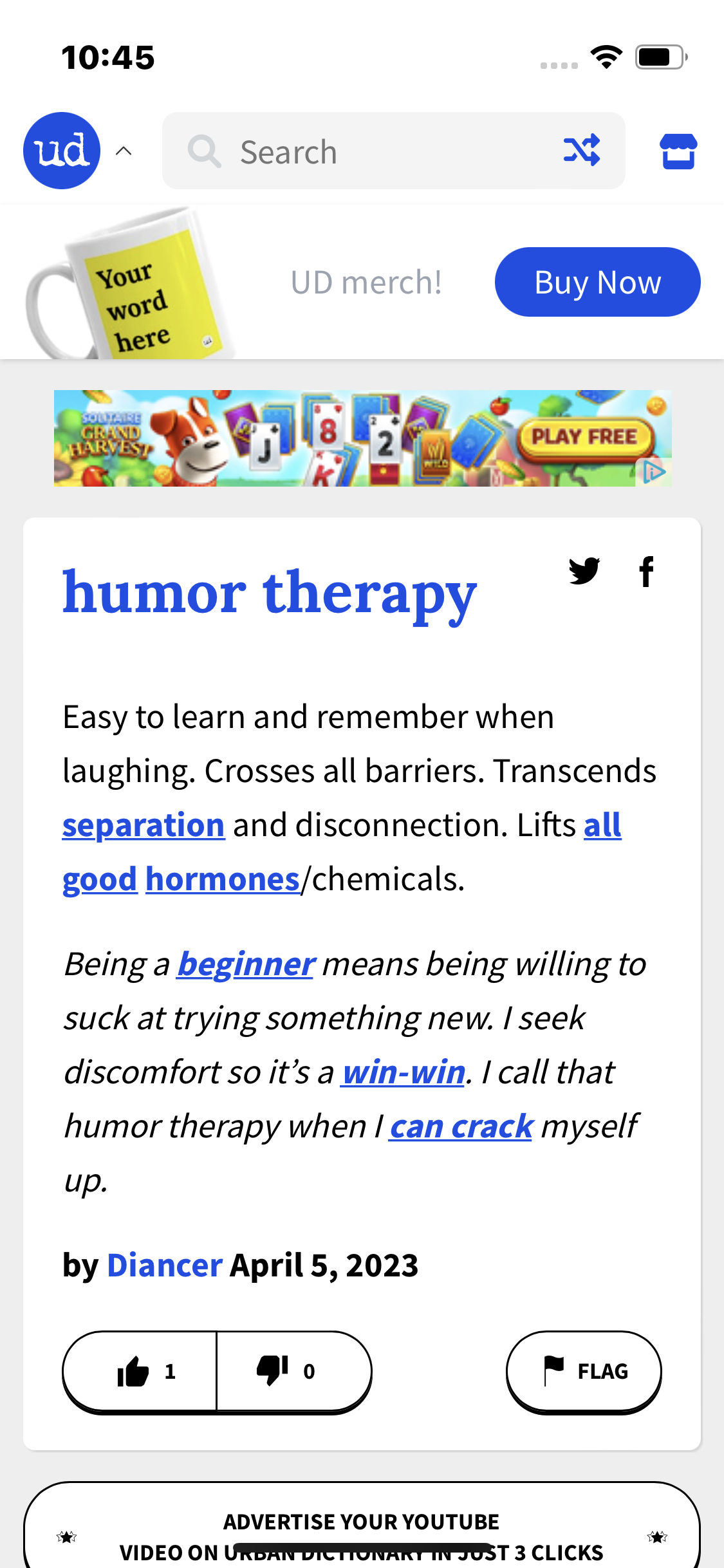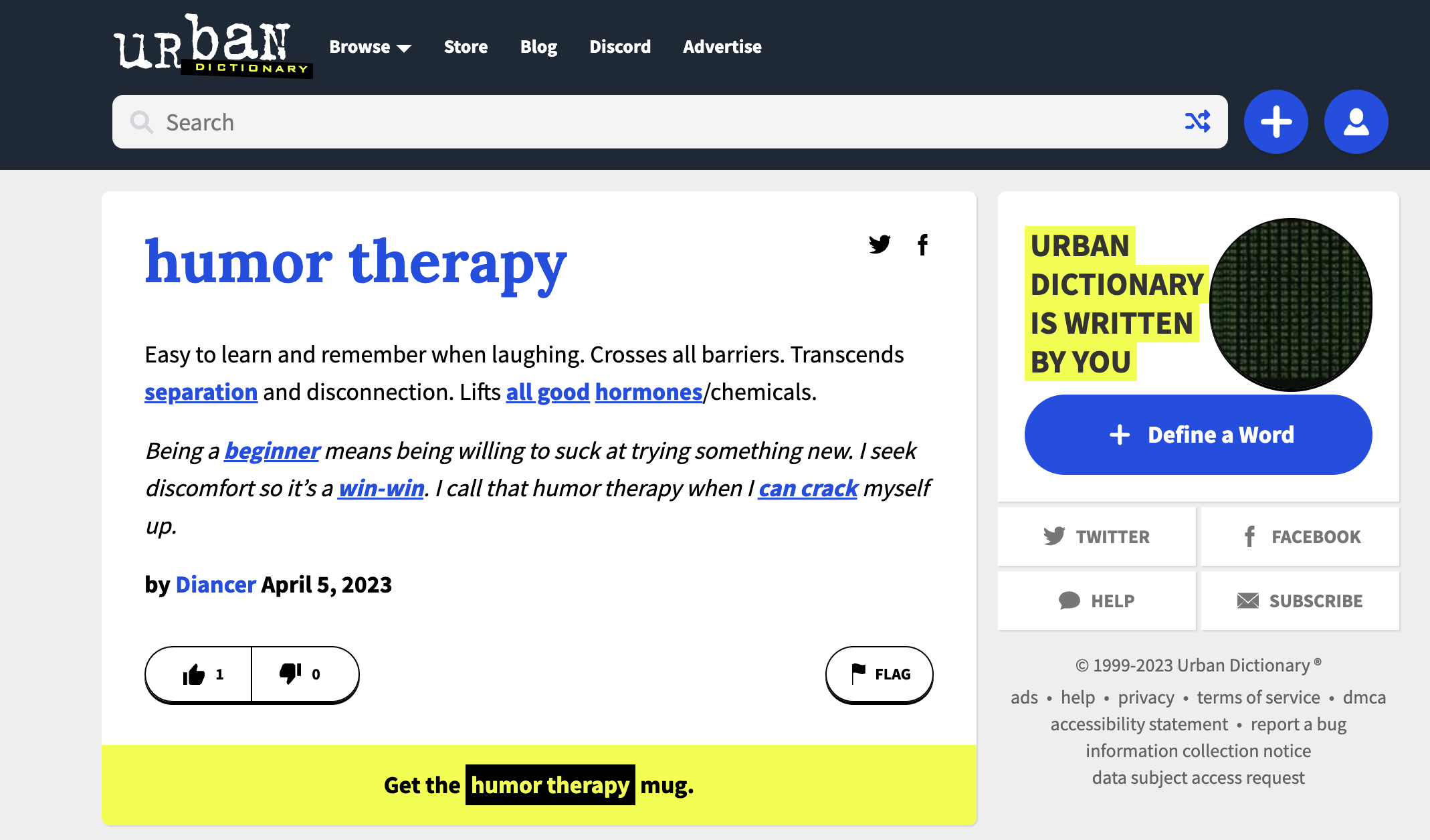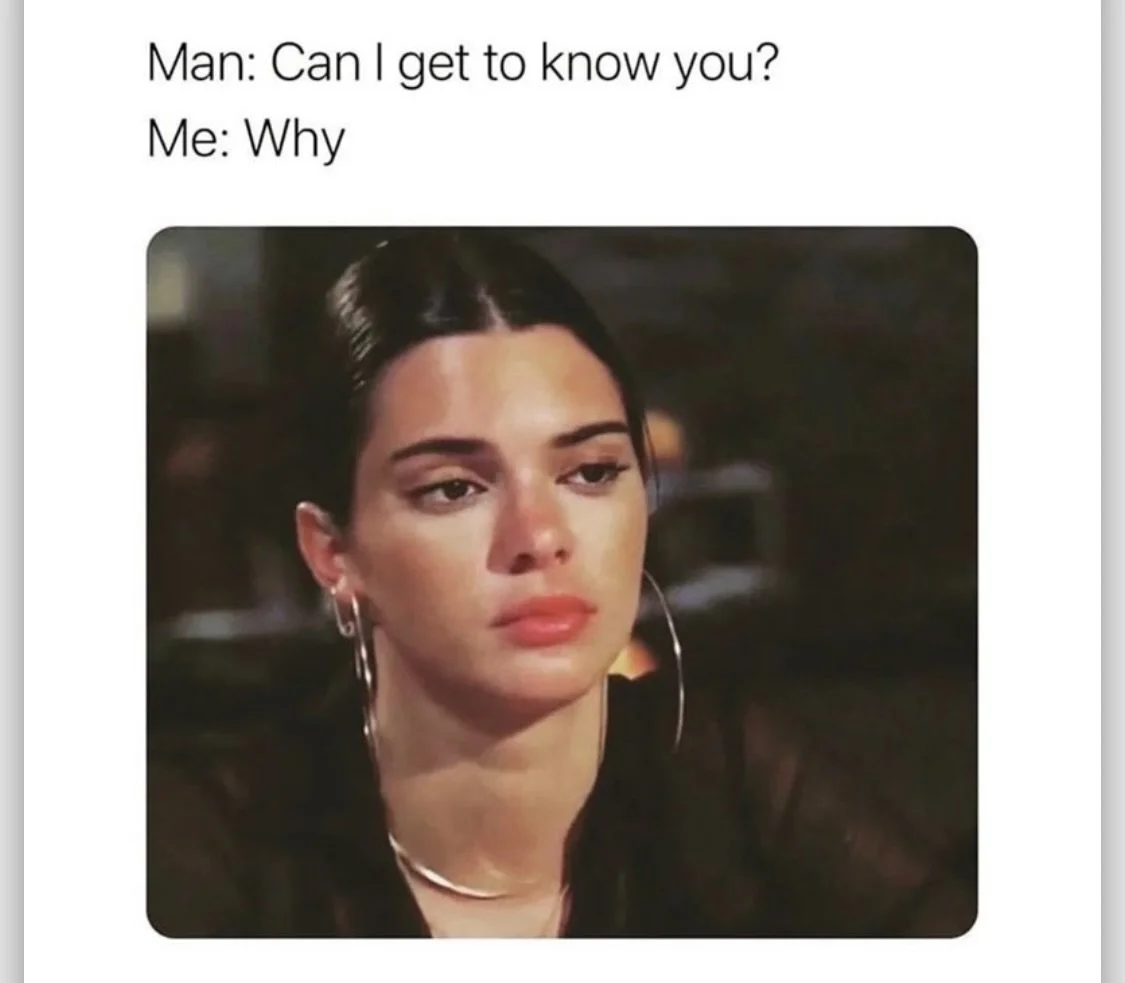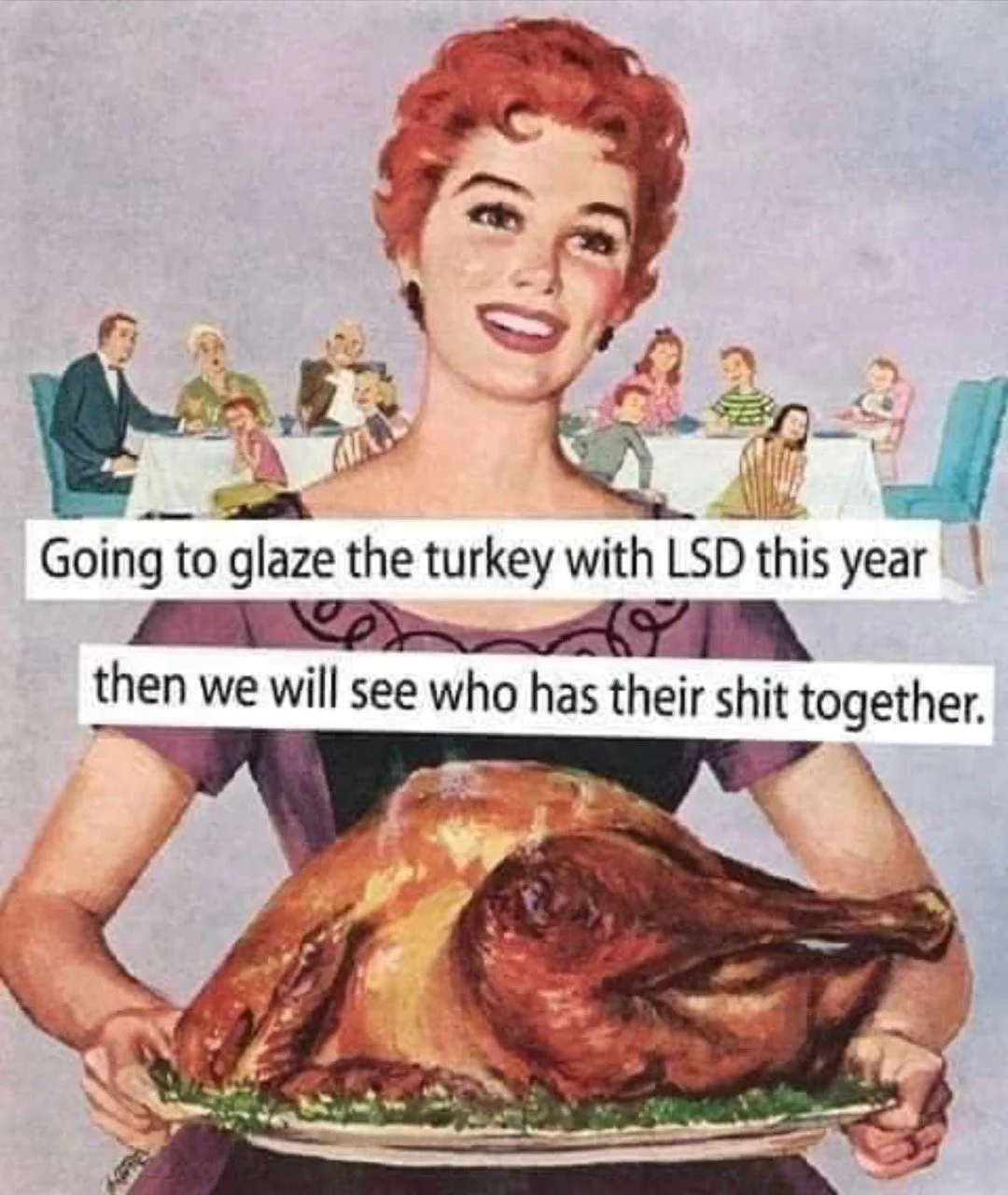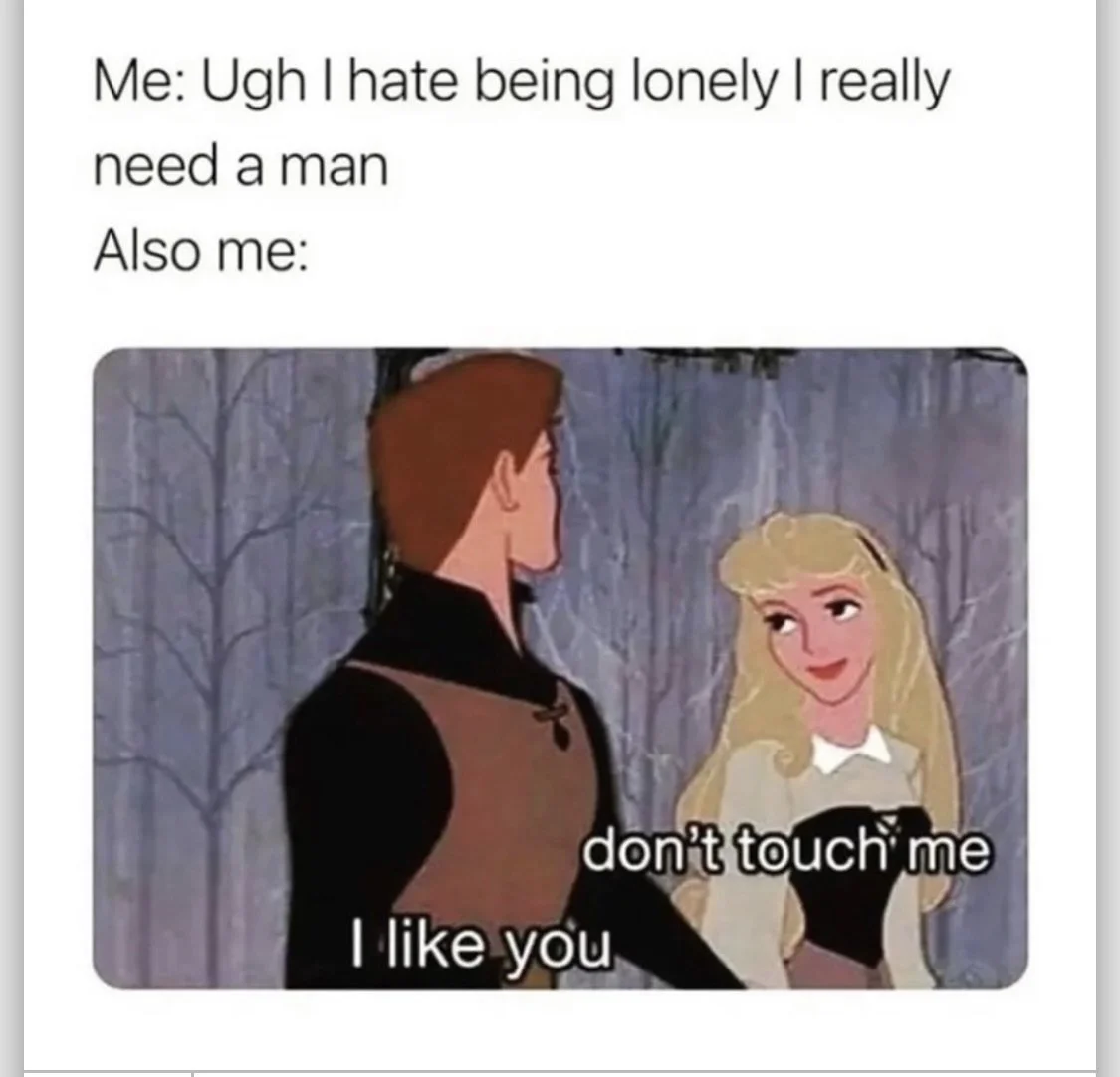🧠 Fun Fact!
📓 Diane’s Definition of “Humor Therapy” Was Published on Urban Dictionary
Yup. They said yes.
Humor therapy: When it’s easier to learn while laughing, transcend barriers, and lift your own damn hormones. Sometimes it’s how you sneak up on healing when the door marked “serious” is locked.
— Urban Dictionary, submitted by Diane A., 2023
Wanna see it in the wild? Here’s the link →
🎈 Levity When It’s Heavy
🧵 A Few Threads to Tug On
Comedians Who Get Me to Cry-Laugh:
Tig Notaro • Iliza Shlesinger • Taylor Tomlinson • Maria Bamford • John Mulaney • Sebastian Maniscalco • Zach Galifianakis • Neal Brennan (when I want depth & mental health tips with my punchlines)
Podcasts That Punch You in the Gut Gently:
Terrible, Thanks for Asking - Host Nora McInerny
The Journey On - Host Peter Crone
Movies That Made Me Cry… and Then Giggle in the Credits:
Inside Out 1 & 2 • Becoming Nobody
Music That Makes Me Bounce + Break Open:
Trevor Hall • Michael Franti • Ry X • Ludovico Einaudi • Ólafur Arnalds
Because sometimes sounds like cello and sometimes like barefoot dancing.
🎯 Why This Vault Exists
Because your joy doesn’t have to look perky.
Because laughing while grieving is a kind of resurrection.
Because sometimes, the sacred sounds like a cackle.
Let’s Talk About Bittersweet by Susan Cain
Bittersweet: How Sorrow and Longing Make Us Whole, explores the power of embracing the "bittersweet" state of mind, characterized by a simultaneous experience of joy, sadness, and yearning. Cain argues that this perspective, often overlooked in favor of a relentless pursuit of positivity, can lead to deeper connections, greater creativity, and a more meaningful life.
The book delves into the reasons why we experience sorrow and longing, suggesting that these emotions are not just unavoidable but also offer valuable insights into ourselves and the world around us. Cain explores how acknowledging and even embracing these bittersweet moments can lead to:
Increased creativity:
By recognizing the duality of human experience, we can tap into a wider range of emotions and perspectives, fueling our creative potential.
Deeper compassion:
Understanding our own capacity for sorrow and longing can foster empathy and compassion for others who are experiencing similar emotions.
Stronger connections:
Acknowledging the bittersweet nature of life can help us connect with others on a more profound level, recognizing our shared humanity and experiences of both joy and loss.
A more meaningful life:
By accepting the full spectrum of human emotions, we can find greater purpose and meaning in our lives, rather than striving for an unrealistic and ultimately unfulfilling ideal of constant positivity, according to book summary sites.
Through research, storytelling, and memoir, Cain encourages readers to move beyond the societal pressure to be perpetually happy and instead, to find solace and strength in the bittersweetness of life.
Note from Diane: Did you know that “minor keys or chords” help a person feel their “mixed emotions” which is what I said might possibly be present in every moment. Maybe be curious to see if you find that to be true in your own life?
💥 Why I Love My Sense of Humor:
The Superpower That Never Ghosts Me
Here’s what I know:
When the bottom drops out, my sense of humor leans in.
Not the kind that deflects or dismisses.
Not the ha-ha to hide the holy-sh*t.
But the sly, soul-soaked wink that reminds me —
I’m still here.
And that alone is worthy of a smirk.
I don’t wear humor like a mask.
I wear it like a second skin —
soft, scrappy, breathable.
It’s how I metabolize grief.
How I flirt with joy.
How I teach, connect, survive, and surprise even myself.
This isn’t new.
It runs in the family.
My dad — a man whose childhood held more hardship than most could imagine —
grew up alongside his sister learning how to ride the edges of heartbreak with something sharper:
humor.
They joked, they played, they survived.
And somehow, they did it without closing their hearts.
That’s legacy resilience.
That’s post-traumatic growth.
And it lives in me now — passed down not just through DNA,
but through the punchlines that made pain a little more bearable.
I tell that story (and so many more) in my first kit:
“WTF is ‘Enough?’”
Because when we’re working with transgenerational trauma,
we’re not just sifting through wreckage —
we’re uncovering gifts.
Humor is one of mine.
And it’s the one inheritance I chose to keep.
When I pass it on, you better believe it’ll come wrapped in irreverence,
with a side of mischief
and just enough light to see your own way through the dark.
🪷 How to Grow a Wicked Sense of Humor
(Without Trying to Be “The Funny One”)
Yes, I’ve actually Googled it.
Turns out, developing a sense of humor isn’t about punchlines or performance — it’s about presence. I’ve even ordered books on it (no shame), hoping for a secret doorway to delight. Still waiting. But along the way, I did find a few ways to wake up my own laugh — the honest kind that bubbles up, even when I’m alone.
A few invitations, if you’re curious:
– Start noticing what actually makes you laugh.
Comedians, movies, memes, awkward silences — it’s all data. (I’ve got a running list if you want to compare.)
– Pay attention to when you laugh for real.
Not because someone else did. Not because it’s polite. Just the kind that catches you by surprise.
– Let your emotions off the leash.
Laughers are usually criers. If you want more giggles, you might have to welcome the tears too. (Annoying, I know.)
🌀 “You can’t selectively suppress emotion.” — Every decent therapist (including this one 👵)
Here’s what that really means:
If we try to numb the hard stuff — grief, anger, fear, old heartbreak — we unintentionally dim the dial on everything else, too.
Joy. Wonder. Ecstasy. Play.
You can’t block the lows without muffling the highs.
I didn’t fully get this until I was 69, post-heroic dose, snacking on blueberries and savory muffins, when someone wise looked me in the eye and said:
“The degree to which you avoid the pain… is the degree to which you also limit your capacity to feel delight.”

